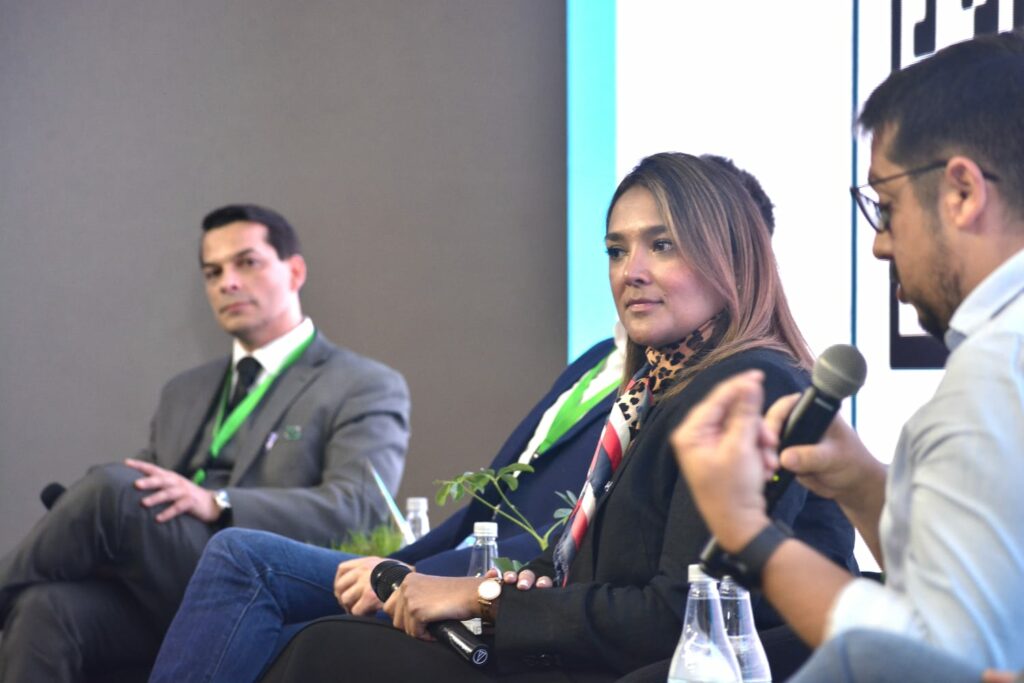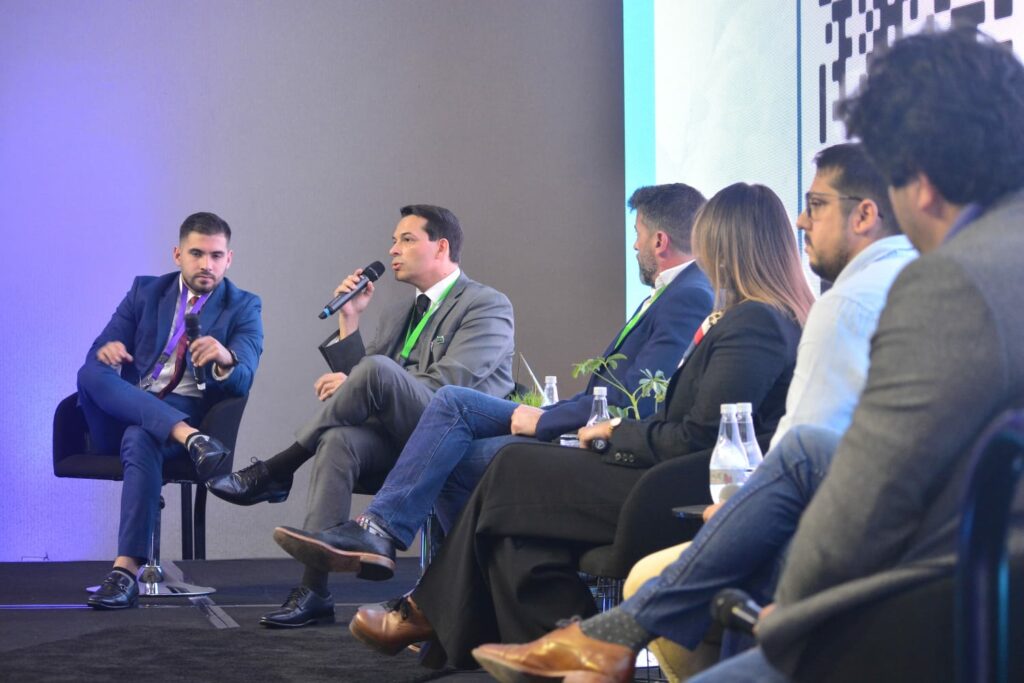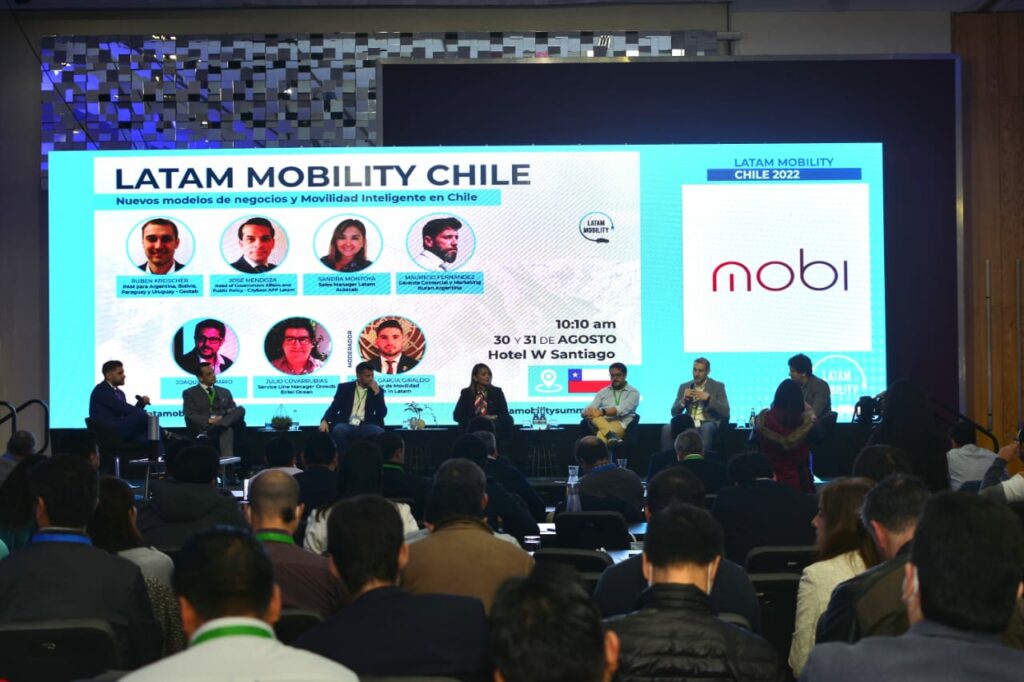Business models inspired by the collaborative economy and digital technologies are helping to create innovative ways of moving from one place to another, and there are now numerous and varied technological solutions related to smart mobility, whose main objective is to make movements and flows more efficient and less polluting.
This key issue in the development of sustainable mobility had its space in the face-to-face meeting “Latam Mobility: Chile 2022“, through the panel: “New business models and Smart Mobility in Chile“, which took place on August 31 at the W Santiago Hotel in the Chilean capital.
The panel was attended by Sandra Montoya, Sales Manager Latam of Autocab; José Mendoza Oliva, Head of Government Affairs and Public Policy of Citybest APP Latam; Rubén Kreischer, Partner Account Manager Latam of Geotab; Julio Covarrubias, Service Line Manager Crowds of Entel Ocean; Mauricio Fernández, Commercial and Marketing Manager of Iturán Argentina; Joaquín Di Mario, CEO of Ualabee, under the leadership of Andrés García, Mobility Director of Invest in Latam.
Data-driven Decisions
Julio Covarrubias, Assistant Manager of Entel Ocean, Entel’s digital unit, a company that advises organizations to make decisions based on large volumes of data, pointed out the importance of understanding big data for mobility. “We must know how people move on a daily basis, through applications, anonymously with data privacy. You can even, enrich that phone data, with gender, age, or socioeconomic group, to be able to generate indicators that allow us to make decisions and support public policies.”
Covarrubias pointed out the need to know the mobility of people in terms of the construction of cities. “If we want to plan a city I have to understand what the mobility of that city is like. Is it the same intensity in all areas, or what safety decisions can I make based on the differences in mobility by gender? The mobility of the elderly, with what data can I make decisions to be able to understand how the last mile has to reach them, or to know the distances they travel and what are the public services they go to for their pension, to buy food or medicine?
The Entel representative continued: “It seems that these are social issues, but they are mobility issues. The way in which we are understanding people’s mobility and their spatial footprint, allows us to know where I have to, for example, put the charging points. All of that drives decision making. It is no longer a photo, it is a film that allows you to make descriptive and prescriptive decisions”.

Connectivity
Rubén Kreischer, Partner Account Manager Latam at Geotab, explained that his company connects all types of vehicles, light, medium, heavy, electric and combustion vehicles to gather information and help organizations manage their assets. “Today we have more than three million connected vehicles worldwide. In Latin America there are 28 million commercial vehicles and only 20% have telematics connectivity or telemetry. There is a great opportunity to keep improving, developing this industry and making mobility more sustainable.”
“At Geotab we see three major groups where we can work a lot with sustainability: the first is fuel consumption; the second is route optimization; and the third is driving behaviors and how we can help companies make their drivers more efficient. It has been proven that a driver with good habits can save up to 5% in monthly fuel consumption. It is working with data and that is where we have to aim to help companies become more sustainable,” said Kresicher.
In addition, the Geotab representative indicated that there are two differentiated lines of work: “One has to do with the short term in the traditional fleet, 95% of which is combustion, so we can work on reducing fuel consumption. We know that there are fleets that consume 30% to 35% at idle, a practice of leaving the engine running without moving forward. There, companies can begin to set goals, since from 35%, it is lowered to 30%, which is equivalent to one tank of fuel per month.”
“Another point is the issue of traffic, the optimization of routes to make deliveries more efficient or to make tasks more efficient. We have an example in the city of Madrid, in a company that had to collect waste, and thanks to the incorporation of Geotab and technology was able to reduce up to three times its daily route. Imagine a fleet of trucks that enters a city and reduces its route by three times, it would have an impact on fuel consumption, gas emissions and noise. These are actions we can take.
Integration
Joaquín Di Mario, CEO and co-founder of Ualabee explained that his company integrates in the same platform, routes and schedules of everything that is public transport, metro, train, buses, micromobility services and operators, in order to optimize travel and urban displacements of people in cities. “We offer travel and mobility analytics tools for the public and private sector to boost their business and improve urban planning.”
“Latin America has four of the 10 cities with the worst traffic in the world. In Lima, just because of pollution, life expectancy is five years less than in other cities, and if we take it to the time we lose in an average city, it is 300 hours a year in traffic. Another example is Santiago de Chile, the city that is worst in this ranking, with traffic that impacts the economy, so we have to work for the efficiency of mobility.”
“At Ualabee we are clear that mobility is centered on people and we understand that public transport combines with an electric scooter or with a service, and furthermore, that talking about sustainability also implies talking about environmental, social, economic impact and accessibility. We act as a link that unites the different means of transportation, and from the information of the ecosystem and working together, we can boost other businesses in the sector,” said Di Mario.
“We are about to launch a program called “Empresa Amiga de la Movilidad Sustentable” where we make it possible for any company to provide the platform, which in turn generates different mobility data that can be measured, and that generates footprint savings. In 2021, in Argentina, users saved more than 32,000 tons of CO2 by using Ualabee, which is equivalent to one and a half million trees. We provide the platform with impact metrics so that customers can measure the evolution of the sustainable mobility of their employees within the company”.
Offering solutions
Sandra Montoya, Sales Manager Latam at Autocab, pointed out that her company developed specific software for vehicle reservation and dispatch with a focus on the cab industry. “Basically, we make life easier for operators; we add more demand and, additionally, we optimize the entire dispatch management in cab and executive transportation services”.
The representative commented on the initiatives being undertaken by Autocab. “We have been opening up the platform more to integrate other players that are within the ecosystem, including in the transition of traditional fleets to electric fleets, as well as the allocation of people who are mobilized in corporate trips when they are multiple and from different stops, since we effectively have to think about assigning the most efficient, close and optimal vehicle, and if it is electric, in its ability to go, return and be in a charging location.”
“In Latin America we have 50,000 connected drivers, who can be integrated into all Autocab operator networks and even work for large apps that are connected today. All operators can be available and visible to receive and optimize the drivers’ income, since in order to be profitable they must have a volume of trips, both for the driver and also for the owner. There are many needs to be solved and we understand what the business dynamics are,” said Montoya.
On the other hand, the Autocab executive indicated that “we offer solutions so that the operator can make the whole process of assigning routes much more efficient. In Chile, for example, we are in the pricing of executive transport with tags, where we have to make the fare efficient, make surcharges in real time and the necessary tracking, as well as ensuring that the local operator has all the state-of-the-art technology to be able to compete with large platforms that exist in the market”.

Security
Mauricio Fernández, Commercial and Marketing Manager of Iturán Argentina, an Israeli company that develops, through devices, telematics solutions that provide advanced solutions for controlling vehicles, reducing maintenance costs and optimizing their use and driving. “We take care of the assets, we take care of the people and we take care of the companies that own the assets“.
In relation to the care of people, the Iturán representative indicated that its technology makes it possible to detect an accident at the precise moment it is generated and from there, through a protocol that is validated in all the countries of the region, send the closest attention. “Thanks to this, we have saved many lives in Argentina.”
“This technology allows us to know where the vehicle is, identify any impact of magnitude, contact the person behind the wheel, make an analysis of the situation with fully specialized personnel and define the actions to be taken. In addition, we can know the fuel level, open and close doors and even start the car without using the key,” explained Fernandez.
He also pointed out not only the importance of emissions control, but also the infrastructure needs for the regions. “Normally, the main cities have more access, but when we talk about the interior, as in regions of Chile or Argentina, development is slow and it will take more years to reach an average level in terms of sustainability. Each one of us, company managers and even vehicle users, can make decisions in the short term that will help to achieve results in a much shorter time,” said Fernández.
Providing services
José Mendoza Oliva, Head of Government Affairs and Public Policy at Citybest APP Latam, indicated that his company has an ecosystem that works around the transportation of passengers from the airport to the hotel, which entails the development of the entire service provision structure that revolves around sustainable mobility.
However, he pointed out that “not only do we provide this service, which is the final part, but we are also addressing the necessary financing to enable the growth of the car park, and also the installation of charging points, another of the critical points that this industry requires to be able to talk about sustainable mobility”.
In relation to the vision for the future, Mendoza indicated that critical points must be addressed as an industry, such as the cost of electric vehicles or charging points, in order to facilitate access to this system for the end user. In addition, he emphasized that banks or financial institutions should be involved to enable financing, which would translate into the possibility of eventually banking the driver and, consequently, generate the need for more charging points.
On the other hand, the Citybest representative indicated that the company has the goal of setting up in four countries besides Chile, in Mexico, Colombia and Uruguay. “It is a business model replicable anywhere because it is profitable and allows, at the level of hotels, to take them into consideration as a vehicle charging point, as well as for the development of the tourism industry, since passengers seek to travel and learn, which in turn generates a need to integrate more points in the ecosystem.”
The following is day 2 of “Latam Mobility: Chile 2022”




